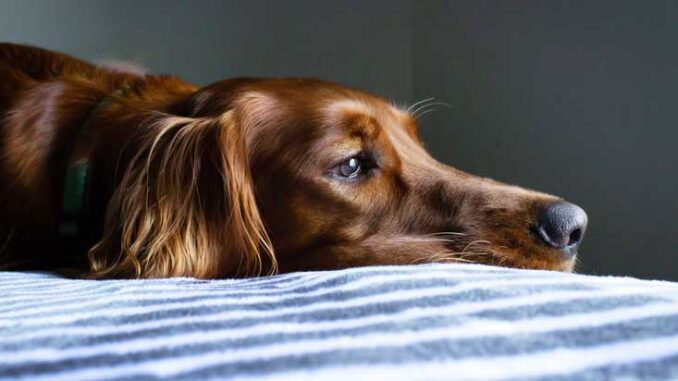
This article was updated on September 1st, 2023

An old dog or a senior dog pooping inside the house isn’t fun for anyone; it creates a nasty mess for owners to clean up and leaves your dog feeling ashamed and embarrassed. No one likes to think of their elderly pooch as having lost their dignity, so if there’s anything owners can do to prevent soiling inside the house, they will do it.
Sometimes elderly dogs will have seemingly forgotten their previously learned toilet training and seem confused about where to poop, and they will end up defecating inside the house. Other times your senior dog may be consciously aware they are pooping but not be able to control it or hold on for long enough.
There are many possible factors that may explain why your old dog has started messing indoors and it’s important to pick up on clues that could point you toward possible causes. Some of these causes are treatable and others can only be managed.
What are the main causes of an older dog pooping/defecating indoors?
Causes can be divided into three main categories: Fecal incontinence, gastrointestinal upset, and cognitive dysfunction/confusion.
Fecal incontinence
Fecal or bowel incontinence refers to a lack of ability of your elderly dog to control their bowel movements; they can no longer prevent the passage of feces out of the anus and so they may spontaneously poop. Sometimes they are aware of the situation and can’t do anything about it, and other times they will defecate / poop and be seemingly unaware of what’s happening or not even notice.
In most cases, bowel incontinence can be attributed to a reduced function of the anal sphincter muscles – a circular arrangement of muscles that controls the release of stools.
Fecal incontinence for senior dogs can be further divided into causes:
- Nerve damage or deterioration of the nerves that control the anal sphincter muscles – as dogs age, the signals that are sent from the spinal cord to the muscles can weaken, over time this leads to a weakness in the muscles too, resulting in an inability for the anal sphincter to fully close.
- Spinal cord/intervertebral disc disease – conditions like a slipped disc can disrupt the outflow of electrical activity from the nerves within the spinal cord that supply the anus, resulting in these nerve pathways being ‘switched off’ and, therefore the sphincter muscles don’t receive the stimulation they require to stay closed.
- Chronic parasitic worm infections – parasitic disease can damage the muscles and nerves within the rectum and anal sphincter.
- Anal tumors/cancer – masses in this area can infiltrate into the cells of the anal sphincter muscles and interfere with their ability to work normally.
- Anal gland disease – infection or impaction of the anal sacs, which sit on either side of the anus, can impact the function of the sphincter muscles. Inflammation and infection cause damage to the muscle cells, so they can’t contract to close the sphincter properly.
Gastrointestinal upset
If your senior dog has only just suddenly started pooping in the house and they appear to have diarrhea, then a stomach upset may be to blame. Elderly dogs with gut problems will often squat multiple times to toilet, have very watery stools and there may even be blood present in the poop.
The sensation of needing to poop or defecate all the time due to diarrhea can lead to your dog going in unusual places, often because they can’t hold on to their stools. If your dog often eats things they shouldn’t and seems unwell in themselves, then this may be the cause of messing in the house. It’s recommended you take them to your local vet as soon as possible.
Cognitive dysfunction and confusion
Also known as ‘doggy dementia’, canine cognitive dysfunction can lead to signs of apparent incontinence, potentially leading to defecating inside the house. Although in these cases, an older dog may not be technically incontinent because their anal sphincter may still function properly, the act of becoming confused or forgetting where to go to the toilet leads to pooping in unusual places and so is often classed as ‘incontinence.’
What can I do to stop my dog pooping/defecating in the house?
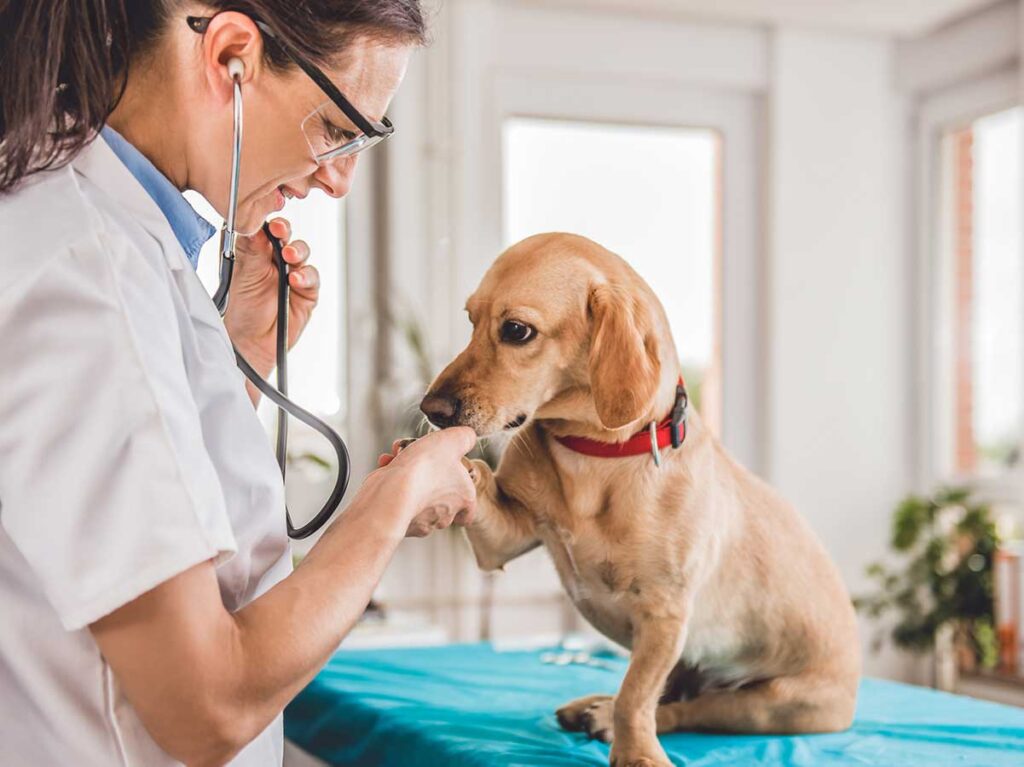
Some causes of your dog pooping in the house can be treated, whilst others can only be managed. The first step is a trip to your veterinarian, who will perform a full physical exam on your golden oldie.
Age-related degeneration of the nerves or muscles of the anal sphincter can only be managed rather than treated – more on how to manage this later.
Spinal and intervertebral disc disease must be investigated immediately. If your dog has had a recent back injury and you think they’ve lost control of their bowels, then it will need addressing quickly. Some back injuries can recover with time and rest; anti-inflammatory medication can help, too. However, some more serious back injuries, like a ruptured intervertebral disc, may require surgical intervention. Your vet may want to perform an MRI scan to ascertain where the problem is and how best to treat it.
Parasitic infections are usually easy to fix and prevent. Always keep your dog up to date with regular worm treatment and they may need a slightly longer course if they have a severe infection.
Anal gland abscesses will require medical attention. Take your dog to your vet for a thorough rectal exam and they may wish to start your dog on anti-inflammatory and antibiotic medication. If your dog is prone to anal gland issues, then increasing the fiber in their diet can help; they may also need their anal glands emptying every few months as a routine to prevent infections from building up (you can learn to do this yourself!). In very severe cases, your dog’s anal glands can even be removed surgically.
Unfortunately, doggy dementia is another cause that can usually only be managed. There are some medications and diets available that aim to increase blood flow to your dogs’ brains to improve their cognitive ability, but the results are often limited.
Dietary changes can help improve the quality of your dog’s stools – particularly helpful if your dog is producing very sloppy stools. These changes aim to firm up the stools, can help improve diarrhea and may allow your dog to hold onto their feces for longer. At the very least, a firmer poop is easier to clean up than a watery one!
Increasing the fiber content of your dog’s diet is one way to do this. There are prescription fiber supplements available that can really help, or try adding some pumpkin, apple, carrot, or green beans to their diet.
How to manage a dog that is pooping indoors
For those dogs whose inappropriate pooping activity doesn’t improve with the above steps, all is not lost. Management changes in the house can massively reduce cleaning time and the frustration that comes with it.
- Doggy diapers – There are various brands of doggy diapers and they have a similar effect as baby diapers! By catching the poop before it hits the floor, it saves the mess that usually ensues. Just be sure to change the diaper regularly. Simple Solutions Disposable Dog Diapers work well, as do Peepers Disposable Pet Diapers.
- Incontinence products – Useful for both fecal and urinary incontinence, here are some of the Best Dog Incontinence Products.
- If possible, keep your dog in rooms that are easy to clean – tiled floors win over carpets!
- Pay attention to your dog’s habits – they may give you clues as to when they’re about to go, giving you a narrow window to get them outside.
- Expressing the bowel – as strange as it sounds, you can learn to stimulate your dog’s pooping habits on command. While it won’t work in every situation, it can certainly save some accidents! You might be able to induce defecation by applying a warm towel to their anus or by pinching their tail.
As you can see, if your dog is pooping in the house, all is not lost. The first step is to take them to your local veterinarian to try and ascertain what the cause may be and if it is treatable. Even if the condition can’t be cured, it can certainly be managed – your vet can help you formulate a plan to make both your and your dog’s lives easier!
Learn more about old dog incontinence and best dog incontinence products.
Read More About Dog Pooping Issues:
 Home Remedies to Help Dog with Mucus in Stools [Vet Approved] - As pet parents, it’s important that we keep a close eye on our pet’s health. While scooping poop may be… [...]
Home Remedies to Help Dog with Mucus in Stools [Vet Approved] - As pet parents, it’s important that we keep a close eye on our pet’s health. While scooping poop may be… [...]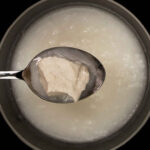 Home Remedies to Help a Dog with Black Stools [Vet Approved] - Scooping poop isn’t anybody’s favorite chore. However, the appearance of your dog’s feces can provide important information about their health… [...]
Home Remedies to Help a Dog with Black Stools [Vet Approved] - Scooping poop isn’t anybody’s favorite chore. However, the appearance of your dog’s feces can provide important information about their health… [...] Is Orange Stools in Dogs a Reason to Worry + Vet Tips to Help - It is not unusual for dogs to come into my clinic with diarrhea and their loose stool will often be… [...]
Is Orange Stools in Dogs a Reason to Worry + Vet Tips to Help - It is not unusual for dogs to come into my clinic with diarrhea and their loose stool will often be… [...] Dog’s Poop is Black But Dog Acts Normal & Seems Fine - Having practiced as a vet for over 10 years now, I’ve seen my fair share of canine poop issues. One… [...]
Dog’s Poop is Black But Dog Acts Normal & Seems Fine - Having practiced as a vet for over 10 years now, I’ve seen my fair share of canine poop issues. One… [...]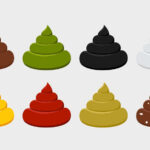 Dog Poop Color Chart: a Vet Explains the Meaning of Colors - Dog poop comes in nearly all colors on the spectrum. Some colors may be alarming, and some may be worrisome.… [...]
Dog Poop Color Chart: a Vet Explains the Meaning of Colors - Dog poop comes in nearly all colors on the spectrum. Some colors may be alarming, and some may be worrisome.… [...]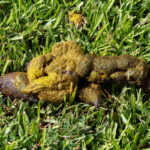 Yellow Dog Poop? Our Veterinarian Shares What to Do - Keeping an eye on your dog’s poop color and consistency can really help you spot changes in his health. One… [...]
Yellow Dog Poop? Our Veterinarian Shares What to Do - Keeping an eye on your dog’s poop color and consistency can really help you spot changes in his health. One… [...] Black Dog Poop? Our Veterinarian Shares What You Should Do - We’re all aware that the normal color of dog poop is brown. It may come in different shades, and some… [...]
Black Dog Poop? Our Veterinarian Shares What You Should Do - We’re all aware that the normal color of dog poop is brown. It may come in different shades, and some… [...] White Dog Poop: Why It Happens and What to Do - Veterinarians see a lot of different colored dog poop, but one color that might surprise dog owners is white. It… [...]
White Dog Poop: Why It Happens and What to Do - Veterinarians see a lot of different colored dog poop, but one color that might surprise dog owners is white. It… [...]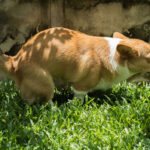 Green Dog Poop: A Vet Shares When to Worry [with Pictures] - Before becoming a veterinarian, my life was not so focused on poop. Now that I’m in practice, I am constantly… [...]
Green Dog Poop: A Vet Shares When to Worry [with Pictures] - Before becoming a veterinarian, my life was not so focused on poop. Now that I’m in practice, I am constantly… [...] Dogs Not Pooping for 3 Days Need Veterinary Care - As a practicing veterinarian, I encounter dogs with constipation issues at least once a week. There are many different factors… [...]
Dogs Not Pooping for 3 Days Need Veterinary Care - As a practicing veterinarian, I encounter dogs with constipation issues at least once a week. There are many different factors… [...]Disclaimer: This website's content is not a substitute for veterinary care. Always consult with your veterinarian for healthcare decisions. Read More.


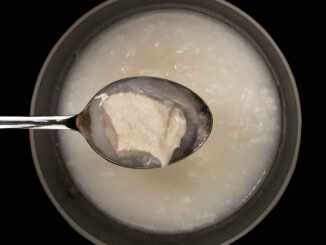
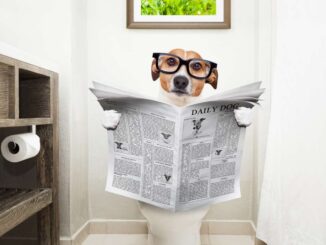
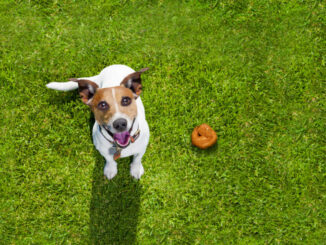
Be the first to comment